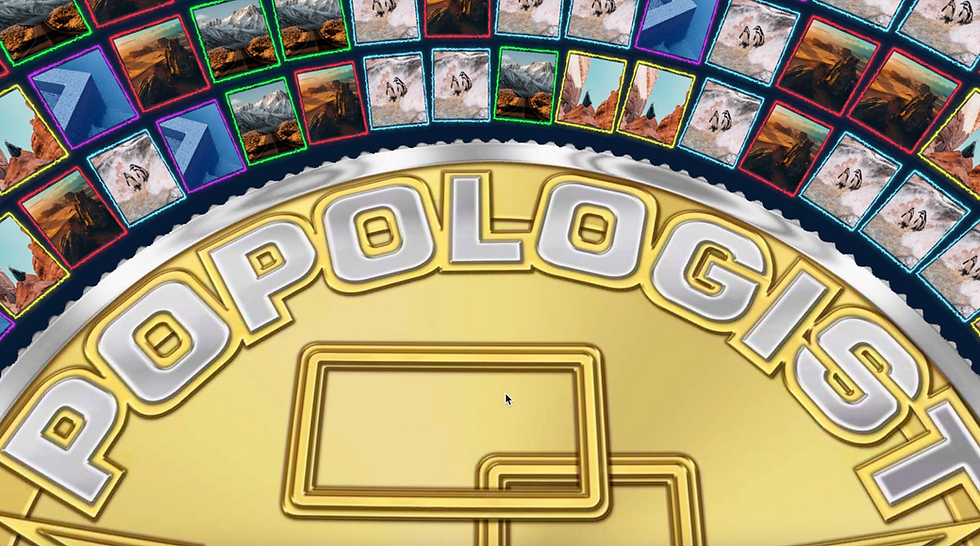Kid Capri: More Than a DJ, A Hip-Hop Icon
- The Gooch

- Feb 17, 2025
- 7 min read
In the heart of the Bronx, where the pulse of hip-hop was just beginning to quicken, a young boy named David Anthony Love Jr. was growing up immersed in the rhythms and sounds of the city.

Born on February 7, 1967, David was surrounded by music from an early age—his father was a musician, and the sounds of funk, soul, and jazz filled their home, planting the seeds of a lifelong passion.
As a child, David was drawn to the turntables, mesmerized by the power a DJ had to move a crowd.
By the age of eight, he was already experimenting with his family's record collection, learning how to blend tracks and create seamless transitions. It was more than just a hobby; it was an obsession.
By the time he was a teenager, David had adopted the moniker "Kid Capri," a name that would soon become legendary in the hip-hop world.
He began DJing at local parties and block events, where he quickly made a name for himself with his energetic style and innovative mixes. Unlike many DJs of the time, Kid Capri didn’t just play records—he performed, hyping up the crowd with his voice, adding a showmanship that set him apart.
In the early 1980s, as hip-hop culture began to take shape, Kid Capri was right in the thick of it. He started creating mixtapes, a burgeoning art form that allowed DJs to showcase their skills and curate the hottest tracks.
His tapes became wildly popular, spreading beyond the Bronx and earning him a reputation as one of the best in the game.

In the early 1990s, hip-hop and comedy were two powerful forces shaping American culture, and at the crossroads of these worlds stood Kid Capri. Already a rising star in the DJ scene, Capri was known for his electrifying mixtapes and high-energy performances.

But in 1992, his career took a pivotal turn when he joined HBO's groundbreaking series, "Def Comedy Jam."

Created by Russell Simmons and hosted by Martin Lawrence, "Def Comedy Jam" became an instant cultural phenomenon, showcasing raw, unfiltered talent from Black comedians who often didn’t have a mainstream platform. The show’s energy was electric, and the crowd was a major part of that experience—which made Kid Capri the perfect choice as the house DJ.

Kid Capri's role on the show went far beyond just playing music. He set the tone for every episode, hyping up the crowd with his signature voice and turntable mastery. The combination of his beats and the comedians' punchlines created a unique atmosphere that felt like a late-night party, where comedy and hip-hop fed off each other's energy.

Week after week, Kid Capri became a familiar face (and voice) in living rooms across America. His presence helped bridge the gap between comedy and hip-hop, making both feel more immediate and alive. His catchphrases and call-and-response style became iconic, and his work on "Def Comedy Jam" solidified him as not just a DJ, but a cultural tastemaker.

The show launched the careers of countless comedians, from Dave Chappelle to Bernie Mac, and Kid Capri was there for all of it, creating a sonic backdrop that elevated the performances and made the show an unforgettable experience.

His time on "Def Comedy Jam" wasn’t just a gig—it was a cultural moment, one that showcased the power of Black creativity and set the stage for future collaborations between hip-hop and comedy.


Even after "Def Comedy Jam" ended its original run, Kid Capri's legacy with the show endured. It cemented his place in entertainment history, proving that a DJ could be more than just a background figure—he could be an essential part of the show’s soul.

Looking back, Kid Capri's journey with "Def Comedy Jam" is a testament to his ability to adapt, innovate, and stay true to the art form he loves, all while helping to shape the culture in ways that still resonate today.
Kid Capri's connection to his base culture runs deep, rooted in the Bronx, the birthplace of hip-hop, where the movement emerged from block parties and urban creativity.

Born David Anthony Love Jr., Capri grew up surrounded by the raw energy of the streets—a melting pot of cultures, rhythms, and artistic expression that would shape his entire career.
The Bronx in the 1970s and early 1980s was a tough place, marked by economic struggles and urban decay, but it was also where hip-hop took its first breaths, driven by DJs who turned turntables into instruments and transformed neighborhood gatherings into cultural revolutions.

Capri came of age during this time, inspired by the pioneers who laid the foundation: Kool Herc, Grandmaster Flash, and Afrika Bambaataa. These legends turned sound systems into storytelling machines, blending breakbeats, scratching, and crowd control into a new kind of musical art form.
As a young DJ, Capri absorbed these influences and added his own twist. While many DJs focused strictly on the music, Capri saw the turntables as a performance tool.

His seamless blends, energetic mic work, and ability to read and move a crowd made him stand out. He wasn’t just playing records; he was orchestrating a vibe, carrying forward the ethos of hip-hop culture—innovation, expression, and community.

Capri’s mixtapes became legendary, circulating through the streets of New York and beyond, capturing the spirit of hip-hop in its raw, unfiltered form.
These tapes weren’t just collections of songs; they were cultural artifacts, reflecting the voices of the streets, the struggles, the triumphs, and the dreams of a generation.
What made Kid Capri a true pioneer was his ability to elevate the DJ from the background to the forefront.

Hip-hop culture was built on this sense of elevation—taking what society discarded and turning it into art. Capri did this with his career, turning the role of the DJ into something dynamic and essential, a bridge between the music and the people.
Beyond his personal success, Capri has always honored the roots of hip-hop, paying homage to the trailblazers while mentoring new generations of DJs and artists.
He embodies the cultural principle of "each one, teach one," recognizing that the power of hip-hop lies not just in its beats and rhymes, but in its ability to uplift and connect people.

Kid Capri's connection to his base culture is a living testament to the resilience and creativity of the Bronx, and his work continues to inspire, reminding the world that hip-hop was never just about music—it was, and remains, a cultural movement born from the soul of the streets.
Kid Capri's career has been marked not only by his legendary solo work but also by an impressive array of collaborations that have left an indelible mark on hip-hop and beyond.

As a DJ and producer, Capri’s ability to blend sounds and bring an energetic, crowd-moving vibe made him a sought-after name for artists looking to elevate their music.
One of Capri's most notable collaborations came with KRS-One, the Bronx-born hip-hop icon. Kid Capri produced several tracks for KRS-One's 1995 album "KRS-One," including the infectious anthem "Rappers R N Dainja."

The partnership was a natural fit, as both artists shared a deep respect for hip-hop’s cultural roots and an unrelenting passion for the craft.
Capri also made waves with his work on Jay-Z's classic album "Reasonable Doubt." His contributions to tracks like "22 Two's" highlighted his ability to create seamless transitions and add a layer of energy that made the album a defining moment in 90s hip-hop.

Beyond production, Kid Capri’s skills as a live performer brought him into collaborations with some of the biggest names in music. He toured with R&B legend R. Kelly, DJ'd for Diddy, and shared the stage with artists like Nas, Snoop Dogg, and Busta Rhymes, creating electric atmospheres wherever he went.
His influence wasn’t limited to just hip-hop, though. Capri's eclectic tastes and deep knowledge of multiple genres made him a natural fit for producing and remixing tracks for a wide variety of artists, including Madonna and Heavy D. This versatility allowed him to transcend genre boundaries and establish himself as a cultural connector.

In 1997, Kid Capri dropped his own major-label album, "The Tape," which featured collaborations with some of the hottest MCs of the era, further solidifying his role as both a creative force and a tastemaker.
Perhaps one of the most meaningful collaborations of Capri’s career, though, has been with hip-hop culture itself. From crafting mixtapes that defined an era to working with legends and up-and-comers alike, Capri has always remained a bridge between the past, present, and future of the genre.

His collaborative spirit is grounded in a love for the art form, and his ability to bring people together through music remains a testament to hip-hop’s enduring power.
Whether behind the boards, on the mic, or in front of thousands of fans, Kid Capri's collaborations tell a story of a man who understands that hip-hop is, at its core, about community—and that the best music is made when creative minds come together to make something greater than themselves.

Beyond his technical skills and showmanship, Kid Capri’s legacy is about cultural preservation and mentorship. He has always paid homage to the pioneers who came before him, while also uplifting and teaching the next generation of DJs and hip-hop artists. His dedication to the craft is rooted in a belief that hip-hop is more than music; it's a living, breathing culture that deserves respect and care.

In the studio, on the stage, or behind the turntables, Kid Capri embodies the essence of hip-hop: creativity, resilience, and community. His legacy is one of breaking boundaries, setting new standards, and reminding the world that DJs aren’t just playing records—they’re telling stories, building connections, and shaping cultural history.

As hip-hop continues to evolve, Kid Capri's influence remains palpable, a testament to the power of staying true to the art form, respecting its roots, and pushing its boundaries. His story is a reminder that legends aren’t just made by talent alone, but by passion, innovation, and a deep love for the culture.











Comments